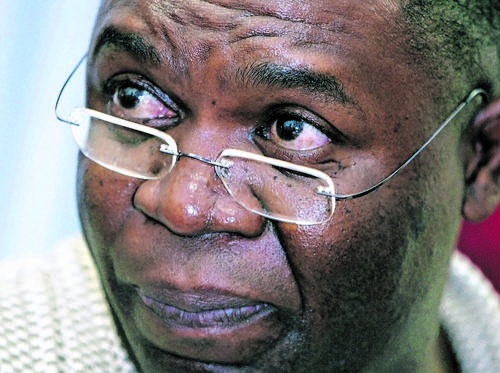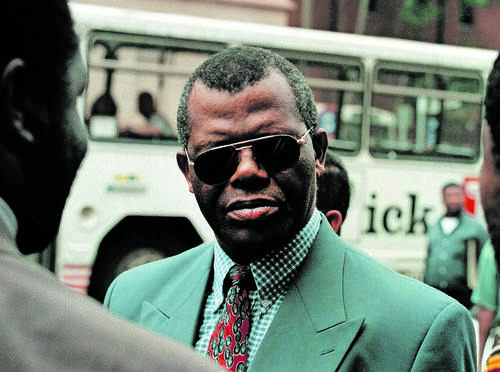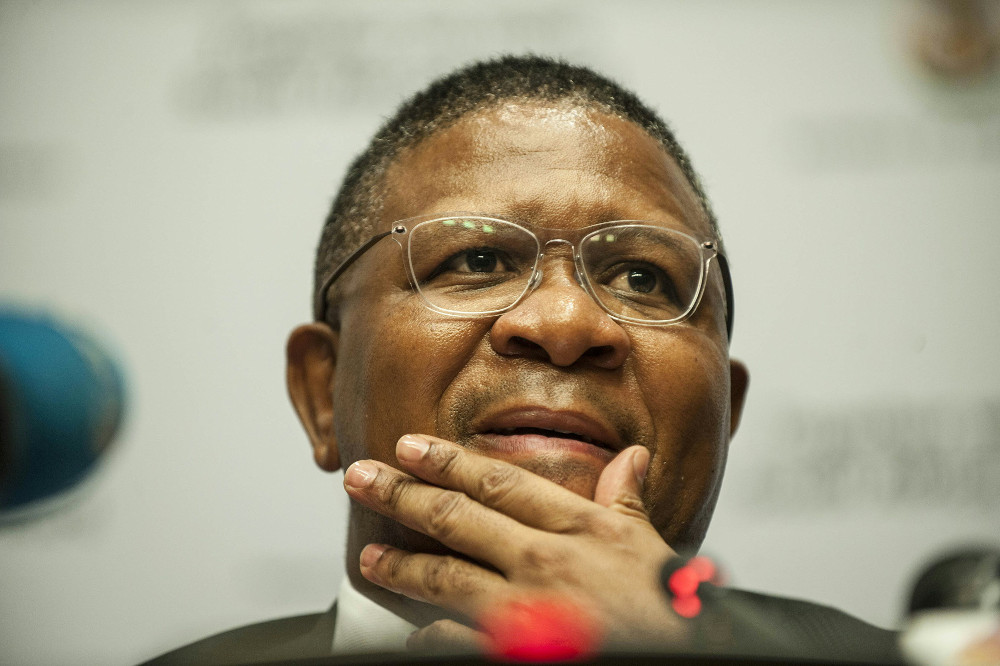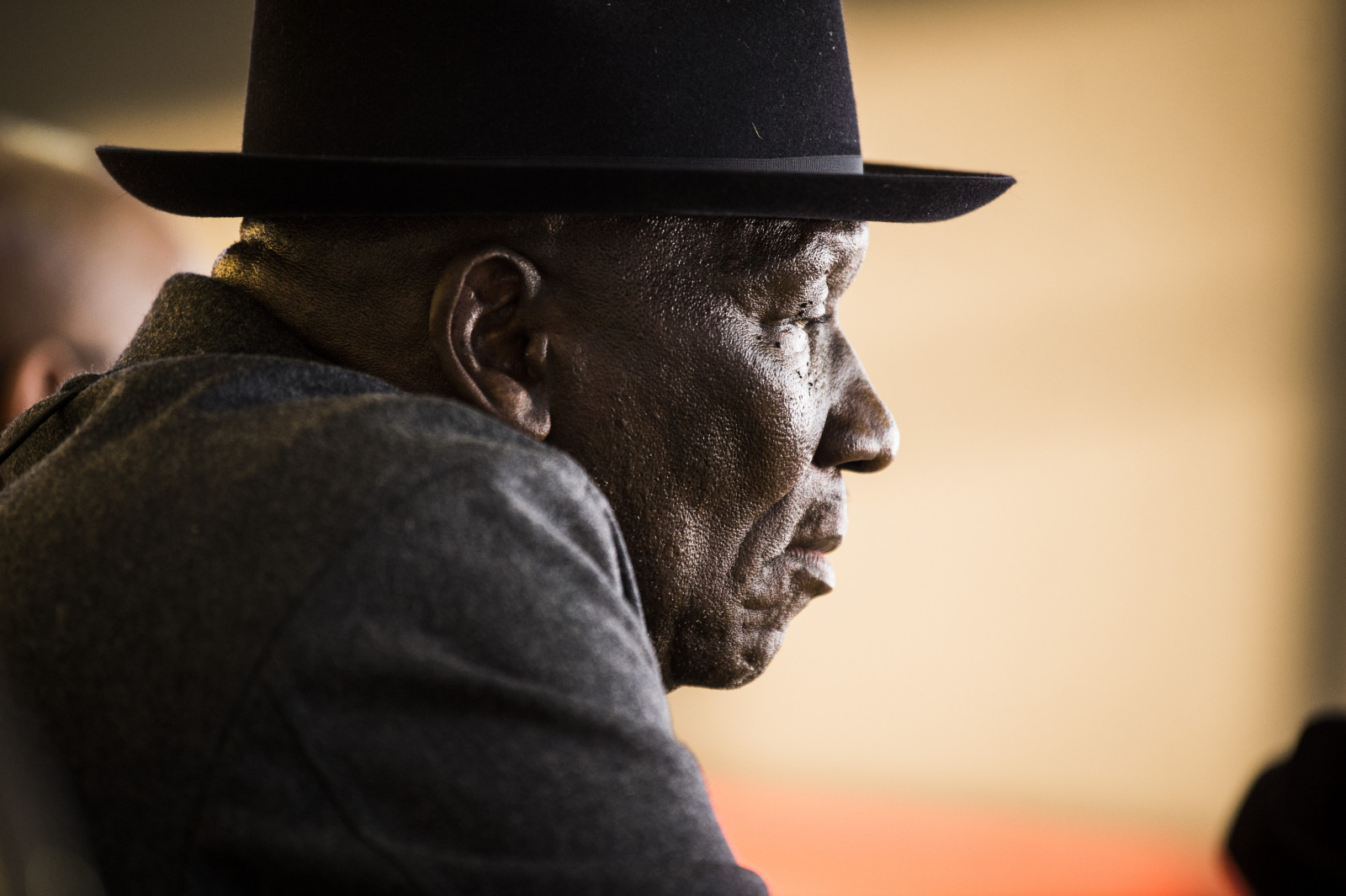The National Joint Operational and Intelligence Structure made the additional deployment as social media mobilisation against the election results continued. (File photo by Jaco Marais/Getty Images)
All police ministers flunk fight against crime
There have been seven ministers over the past three decades and not one of them has cracked a decent crime-busting grade
GRADE = F
South Africa’s democratic government inherited a police force that was an integral, brutal cog of the apartheid regime, a tool wielded to uphold the system, oppressing black citizens and quashing rising civil unrest.
This ingrained culture of violence, together with corruption in the South African Police, which was reorganised and renamed the South African Police Service in 1994, has complicated the work of every police minister over the past 30 years, a task exacerbated by rising and intensely violent crimes.
Sydney Mufamadi (1994-1999)
Mufamadi was the first minister for safety and security (a title later changed to minister of police) appointed by Nelson Mandela after the first democratic elections in 1994.
Mufamadi inherited one of the world’s most dishonest and brutal police forces, and failed to make any progress to instil duty and decorum in its members.
Under his watch, a police force member was reported as being three times more likely to commit an offence than ordinary citizens and the country found its place on the world map as one of the most dangerous destinations. Legal professionals specialising in criminal matters held him in low esteem.
Steve Tshwete (1999-2002)
When Mandela retired, president Thabo Mbeki appointed Tshwethe, who served as police minister until his death in April 2002.
As the second minister in charge of the police under the nascent democracy he should have grabbed the baton to transform the apartheid-stained, understaffed and underpaid police force into a professional service to fight the escalating crime.
A man with a ferocious bark that sparked hope in citizens that criminals were about to feel his bite, Tshwete, for all his posturing, also failed to rise to the challenge.
When Jackie Selebi joined him as the national commissioner of police, he, too, spoke tough and promised action. He was eventually sentenced to 15 years’ imprisonment on a conviction of taking bribes from a drug trafficker but was released on medical parole and died after spending less than a year in jail.
Tshwete and Selebi, in 2000, embargoed the release of crime statistics, deflating public confidence in the reliability of police crime statistics.
Tshwete announced an investigation into an alleged plot by Cyril Ramaphosa, Tokyo Sexwale and Mathews Phosa to oust Mbeki. But, in 2001, the men were cleared and Tshwete apologised to them.
Many years later he denied allegations of ordering the reinvestigation of 14-year-old Moeketsi “Stompie” Seipei’s murder as a way to smear Winnie Madikizela-Mandela’s name. The allegation arose in a documentary about her life in 2017.
Charles Nqakula (2002-2008)
More than a decade into democracy, Nqakula did little to change the upward trajectory of violent crime during his seven-year tenure in the job.
Rather, Nqakula goes down in history for defending Selebi, who will always be remembered as a poster boy of police corruption, and for what he said in parliament in 2006.
Nqakula outraged opposition MPs and the public when he lambasted them for holding the view that the police were not doing enough to combat crime. “South Africans who complain about the country’s crime rate, should stop whining and leave the country,” Nqakula declared.
He also took public flak for travelling to Burundi to promote peace and democracy while violent crime rocked the country back home, spurring him to announce his department’s commitment to tackle the increase in crime.
In addition, Nqakula’s lack of dynamic leadership did not help him during his time in this tough portfolio.
Nathi Mthethwa (2008-2014)
Mthethwa’s leadership was not felt when police gunned down 34 striking miners in the Marikana massacre on 16 August 2012, which marked the most lethal use of security force against civilians since the 1976 Soweto uprising.
The Marikana commission noted in its official report that although Mthethwa’s counsel submitted that he could not “be held liable for the tragic loss of lives at Marikana”, attorneys representing 270 injured or arrested mineworkers asked the commission to recommend to the national director of public prosecutions to consider prosecuting Mthethwa for the murders. He was not among the nine people charged in connection with the massacre.
Service delivery protests were on the rise around the country but Mthethwa did not move to reintroduce the disbanded public order policing units.
But, to his credit, from the start of his five-year term he proved himself to be accessible, listening when asked to confront problems such as rural safety. He also invited research groups to inform him about matters affecting policing and he condemned the police brutality and vigilante violence that was sweeping the country.
He also beefed up the capacity of detective services, which was one of his focus areas, leading to an improvement in the number of serious crime case dockets ready for trial, and police effected arrests in prominent cases.
But Mthethwa lost credibility when he retained crime intelligence head Richard Mdluli instead of suspending him while he faced serious criminal allegations.
Mthethwa should also have suspended the national police commissioner, Riah Phiyega, who was under internal investigation.
Mdluli is yet to face his trial on charges of corruption and fraud, opened in 2011.
Mthethwa was criticised when he released crime statistics for 2011-12 in parliament, and reported a 3.1% decrease in murder, a claim the Institute for Security Studies challenged and later disclosed that the data contained a serious statistical error. But heads did not roll for this miscalculation, which hid the rate at which serious violent crime categories are rising.
There were 15 609 murders reported from 1 April 2011 to 31 May 2012, ensuring the country retained its unenviable position of having one of the highest murder rates in the world.

Sydney Mufamadi
1994 – 1999

Steve Tshwete
1999 – 2002

Nathi Mthethwa
2008 – 2014

Nathi Nhleko
2014 – 2018

ANC secretary general Fikile Mbalula

Bheki Cele
2019 – present
Nathi Nhleko (2014-2017)
Nhleko’s tenure as minister of police is probably best described as disastrous.
He abused his power to perform his work as a henchman of president Jacob Zuma, launching investigations into his boss’ political enemies.
Nhleko made controversial changes in the leadership of the Directorate for Priority Crime Investigations (the Hawks), suspending its head, Anwa Dramat, and appointed Berning Ntlemeza as his replacement. The Pretoria high court later declared Ntlemeza’s appointment invalid after the Helen Suzman Foundation filed an application challenging Nhleko’s decision.
In 2016, he established a multi-disciplinary police task force to investigate and prevent political killings in South Africa but this crime category has continued unabated.
On the issue of finances and management, the auditor general found that the financial management, governance, control and leadership of the department under Nhleko had regressed.
Fikile Mbalula (2017-2018)
Mbalula’s performance did little to restore confidence in the police during his brief tenure, despite talking tough against crime in his first week on the job.
He echoed the gung-ho remarks he had previously made as deputy minister of police, promising to take a strong stance against crime and telling police officers to “meet fire with fire” when faced with criminals.
Mbalula made an effort to restore the morale and reputation of the police and worked to remove the irregularly appointed Ntlemeza from his position as head of the Hawks. He also fired acting national police commissioner Khomotso Phahlane.
But the 2017-18 police crime stats did little to restore the public’s confidence in the police.
A study showed an increase in murders, attempted murders and sexual offences.
His time in office was brief, giving him little time to do much about reducing the high crime rate, but his efforts to take a tough stance and to remove Ntlemeza deserve acknowledgement.
Bheki Cele (2019-present)
Cele is another tough-talking police minister who has plunged himself into hot water for his reported remarks to police officers to “shoot and ask questions later” when faced with alleged criminals.
South Africa’s criminality score has worsened over the past two years, according to the 2023 Global Organised Crime Index, ranking the country seventh in the world out of 193 countries and third in Africa for mafia-style criminal networks and organised crime syndicates. As one criminology expert recently described the situation, South Africa has become an “attractive destination” for organised criminal syndicates because of its weak policing, justice system and governance.
Cele’s leadership attracted criticism for the use of “excessive policing” of Covid-19 lockdown compliance, including the confiscation of alcohol, and his plainly ridiculous “no kissing rule” for partners, saying it was against social distancing regulations.
“Maintain social distancing, even at night. Don’t come close to each other, no kissing, nothing,” Cele said.
He was also in charge during the July 2021 riots in KwaZulu-Natal and parts of Gauteng when violence claimed 342 lives and looting and destruction cost the economy billions. There were few police officers in sight for days to restore law and order, forcing residents to protect themselves, their families and properties.
Cele supports strict gun control and does not believe private citizens should be permitted to own firearms. The Firearms Control Amendment Bill, introduced during his leadership in 2021, proposes that self-defence would not be considered a valid reason for owning a firearm.
The murder rate, which, according to the latest police crime statistics, declined by 3.1% from July to September this year, showed that 6 945 people were murdered during this period. A total of 10 516 rapes were reported, representing a drop of 0.7% compared with the same period in 2022, while the number of sexual assaults dipped by 35.9%.
“It is clear, attacks and violence meted on women, children, the elderly and the most vulnerable in this country, remains shameful,” Cele said when releasing the statistics in November.
Criminologists have criticised the police service for its inability to prevent and investigate crime, its failure to gather intelligence and lack of professionalism despite its R108 billion budget for 2022-23.
The department scores an overall dismal F.
Get the M&G’s take on other ministries over the past 30 years:
Department of Health
Department of Public Enterprises
Department of Finance
Department of Forestry, Fisheries and the Environment
Department of Human Settlements
Department of Justice and Constitutional Development
Department of Education